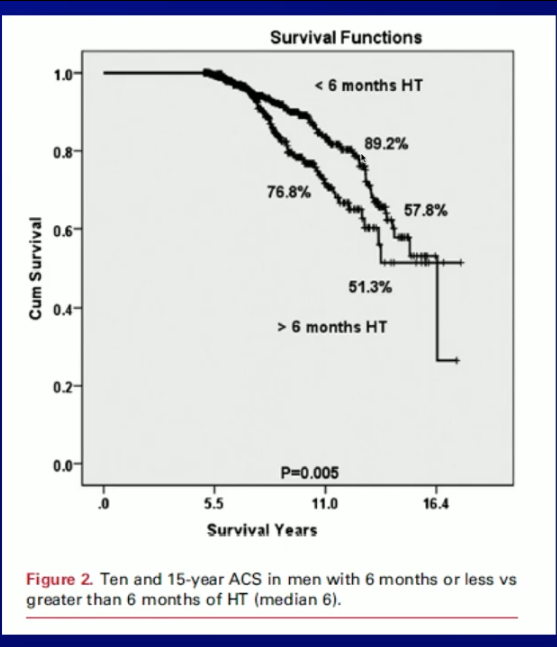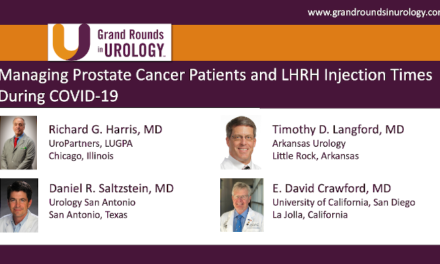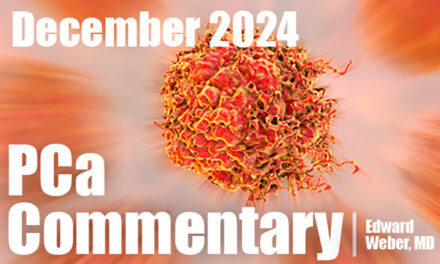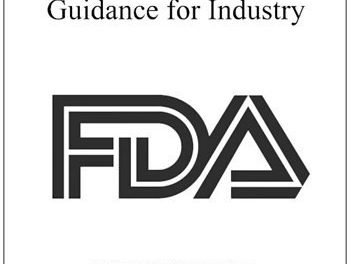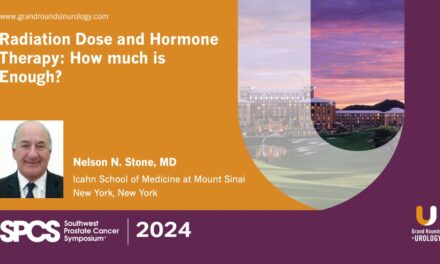Nelson N. Stone, MD, presented “Long-term Morbidity of ADT and Radiation Therapy” during the 24th Annual Southwest Prostate Cancer Symposium on April 14, 2019 in Scottsdale, Arizona.
How to cite: Stone, Nelson N. “Long-term Morbidity of ADT and Radiation Therapy” April 14, 2019. Accessed Jun 2025. https://grandroundsinurology.com/long-term-morbidity-of-adt-and-radiation-therapy/
Long-term Morbidity of ADT and Radiation Therapy – Summary:
Nelson N. Stone, MD, discusses long-term data about extended neoadjuvant hormone therapy following radiation therapy for high-risk prostate cancer patients. He observes the morbidity, mortality, and testosterone recovery rates of extended hormone therapy, especially in patients treated with hormone therapy for over 6 months.
Abstract:
Until recently, there has been a lack of data with long-term follow-up to provide a consensus regarding the benefits and/or risks of extended neoadjuvant hormone therapy for prostate cancer patients previously treated with radiation. While research has shown that hormone therapy may have some negative effects, there is no clear pathway as to how physicians should respond to these findings.
For example, one study indicated that patients treated with 3 years of hormone therapy have a harder time regaining pre-castrate levels of testosterone than patients treated with 6 months of therapy. This could mean that patients who have other risk factors that may make it difficult to regain testosterone, such as high body-mass index and low baseline testosterone, should not receive hormone therapy for as long.
There has been much investigation into the negative effect of hormone therapy on cardiovascular health, though findings have been too inconsistent to reach any conclusions. Another study found that hormone therapy could increase patients’ risk for all-round mortality, but only if they were 73 or older. This could suggest that clinicians should only consider younger patients for neoadjuvant hormone therapy.
Recently reported long-term outcomes put these prior findings into context. 15-year data suggests greater mortality in prostate cancer patients who had more than 6 months of hormonal therapy versus patients who had none. A large, long-term study investigating the influence of neoadjuvant hormone therapy and testosterone levels on all cause survival, controlling for other coexisting medical conditions, found that patients lose approximately 2 years of life by undergoing over 6 months of neoadjuvant hormone therapy.
Considering that researchers have never been able to show that hormonal therapy has a benefit in patients treated with high-dose radiation, this new research may prompt the urology community to reconsider how it uses this method.
About the Southwest Prostate Cancer Symposium
The Southwest Prostate Cancer Symposium (SPCS) is a multi-day conference that seeks to educate urologists, radiation oncologists, medical oncologists, and other healthcare professionals involved in the treatment of prostate cancer. The topics focus on current technical aspects of diagnosis and treatment of localized and advanced disease, particularly regarding imaging, technology, and training in the related devices. Dr. Stone presented this lecture during the 24th SPCS in 2019. In 2020, the 25th SPCS will also offer training sessions involving imaging, scanning, and prostate cancer treatment related devices on site. Please visit this page in order to register for future SPCS meetings.
ABOUT THE AUTHOR
Nelson N. Stone, MD, is Professor of Urology, Radiation Oncology, and Oncological Sciences at the Icahn School of Medicine at Mount Sinai and chief medical officer at Viomerse, Inc.
Dr. Stone earned his medical degree from the University of Maryland in 1979. He completed a Residency in General Surgery in 1981 at the University of Maryland, followed by a Residency in Urology at the University of Maryland. He then completed a Fellowship in Urologic Oncology at Memorial Sloan-Kettering Cancer Center and a Research Fellowship in Biochemical Endocrinology at Rockefeller University in 1986. He was Chief of Urology at Elmhurst Hospital Queens from 1986-1996.
Dr. Stone has founded several medical companies and serves on the editorial board of many scientific journals. He is a member of many professional societies, including the Prostate Conditions Education Council, the Society for Minimally Invasive Therapy, the New York State Urological Society, the American Association of Clinical Urologists, and the American Urologic Association. Dr. Stone has participated in approximately 25 research studies on prostate cancer and has authored more than 500 articles, abstracts, and book chapters, primarily on prostate cancer. He invented the real-time technique for prostate brachytherapy in 1990 and has trained more than 5,000 physicians worldwide through his company ProSeed. His most recent company, Viomerse, creates synthetic body parts (phantoms) for surgical training and has recently released an extended reality remote training platform.

